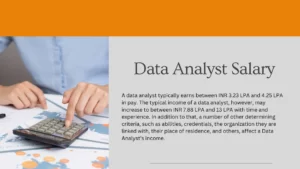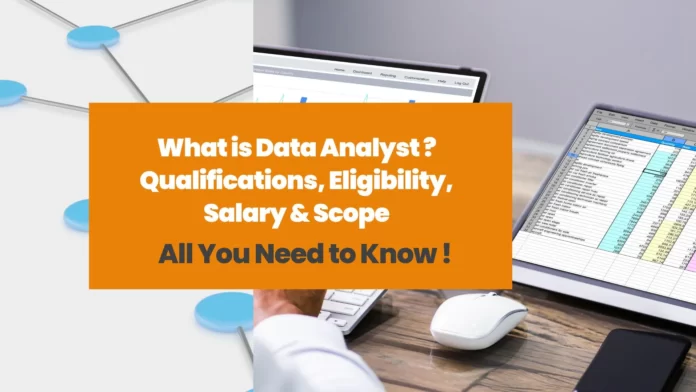Introduction
Data analysts have begun to become much more visible in the job market due to the tremendous need for data across organizations.
Students who are pursuing an undergraduate degree or any other type of qualification in a related field, such as computer science, mathematics, or statistics, satisfy the essential conditions for employment as a Data Analyst. They should also register in any of the best data science universities in the country to pursue graduate data analytics.
What is a Data Analyst?

Data analysts gather, arrange, and examine data sets to assist businesses or individuals in making sense of information and promoting wiser decision-making. While all analysts conduct research to find patterns and trends, data analysts use their technical expertise in statistical programming languages, scripting, data blending, and data visualization to help turn complex business problems into well-informed potential strategies and solutions.
Data Analyst Qualifications
To lay a strong basis for any job, qualifications are a crucial c

omponent. A candidate has a greater possibility of being employed by prestigious organizations and receiving a competitive salary package the more competent they are. Candidates can opt to study undergraduate or graduate degrees in a variety of fields, including Economics, Statistics, Data Science, and Computer Science, in order to become a data analyst.
Data Science
Data science focuses on imparting information in computer science, mathematics, or statistics. With the use of contemporary technologies and methods, this course assists applicants in studying massive amounts of data. To pursue a career as a Data Analyst, one can enroll in a number of courses, including a B.Sc in Data Science and Engineering, a B.Tech in Data Science, a PG Diploma in Data Science, and many others.
Computer Science
This course emphasizes the growth of statistical and analytical abilities. Colleges and universities provide a range of curricula for anyone interested in pursuing a computer science program. The candidate’s understanding of artificial intelligence ideas, algorithm designs, programming languages, etc. will improve as a result of this curriculum. The B.Sc. in Computer Science, the B.E. in Computer Science, and the M.Sc., etc. in Computer Science and Technology are some of the most well-liked courses.
Data Analyst Course Eligibility

In addition to certification or certificate programs, postgraduate programs in computer science and management provide a stream of specialization in data analytics. A Bachelor’s degree from an accredited institution with at least 50% overall or the equivalent, ideally in the fields of science or computer science is the prerequisite for enrollment in a postgraduate Data Analytics program.
Steps to Become a Data Analyst

Students don’t take much time to pick which educational path they want to take or what job they want to pursue in today’s rapidly changing environment. However, it would need some kind of preparation beginning in the classroom.
Students may learn more about the processes necessary to become a data analyst by following the procedures listed below.
Complete Graduation
Get your bachelor’s in a subject like computer science or mathematics that calls for analytical skills and a basic understanding of statistics. By doing so, you’ll have a foundational grasp of the topic and be better able to construct a solid foundation atop it.
Adapt Data Analytical Skills
To succeed in the field, it is possible to develop a variety of data analytical abilities, including those in data visualization, SQL databases, data mining and cleaning, and programming languages.
Pursue Relevant Certifications
To become a data analyst, you can seek a number of credentials, including the Certified Analytics Professional, Google Data Analytics Certificate, and Microsoft Certified: Data Analyst Associate.
Get into an Internship
Participating in an internship not only helps a candidate get ready for the field, but it also offers them first-hand knowledge of it. Candidates will learn how things work in a real environment through an internship.
Check out The Best PG Program In Investment Banking with Placement Guarantee
What Does A Data Analyst Do?

Data analysts can find employment in a range of industries, governments, businesses, manufacturing, education, healthcare, and finance, among others. In short, they can work in any sector that uses data.
But regardless of the industry, they prepare and sanitize data before presenting their results to assist businesses make strategic decisions. They collaborate with teams in engineering and business, and they may also share their results with other divisions like sales, marketing, and finance.
How to Become a Data Analyst?
Through academic study in STEM disciplines like business analytics, statistics, and computer science, one can develop the crucial technical skills important for an analyst profession.
However, obtaining a college degree isn’t the only route to beginning a job as a data analyst. Undoubtedly, 65% of analysts, according to Zippia, have a bachelor’s degree. Only 15% of the population has a master’s degree; the remaining 80% have acquired their talents in other ways.
What Skills Does a Data Analyst Need?

You’ll be best served by a mix of hard and soft talents as you train to become a data analyst.
The following soft skills are advantageous for this career:
- Agility
- Flexibility
- Strategic thinking
- Creativity
- Critical thinking
- Curiosity
- Business acumen
Hard Skills, you need for the field include:
- Scripting: SQL, Python, and R
- Data blending: Informatica, Alteryx, and SAS
- Data visualization: Excel, Tableau, Power BI, D3.js, and ElasticSearch
- Machine Learning: TensorFlow, Keras, PyTorch, and Pandas
- Practical database querying
- Data management
Check out our PG Program In Financial Modelling
Data Analyst Jobs and Tasks
Giving businesses the knowledge they need to strategy more effectively and enhance their company outcomes is one of the main goals of data analytics specialists. To uncover the full story hidden in the data, they achieve this by gathering and fusing data assets.
Analysts provide data-backed scenario planning in addition to providing persuasive data insights to assist businesses assess the risk of various options.
- Descriptive: leverages commercial insight from data mining
- Diagnostic: analyses data abnormalities to determine the cause of an event
- Predictive: based on facts, generates projections
- Prescriptive: focuses on simulation and data optimization
- Cognitive: blends artificial intelligence (AI) and data
Data Analyst Salary

A data analyst typically earns between INR 3.23 LPA and 4.25 LPA in pay. The typical income of a data analyst, however, may increase to between INR 7.88 LPA and 13 LPA with time and experience. In addition to that, a number of other determining criteria, such as abilities, credentials, the organization they are linked with, their place of residence, and others, affect a Data Analyst’s income.
Check out The Best PG Program In Financial Modelling with a placement guarantee
Data Analysts Scope
Companies and governmental bodies can collect data and spot patterns with the use of data analytics. Numerous sectors employ data analytics, which makes a substantial contribution to economic development. According to Analytics India Magazine, there is a huge need for data analytics engineers in India’s non-IT businesses. A number of non-IT sectors now have their own customized solutions thanks to the creative approach of using data analytics and AI to tackle issues.
Following are some of the essential industries where data analytics plays a significant role.
IT Sectors
The IT industry controls 43% of the market for data analytics and continues to do. the leading companies in the Indian IT sector are Tata Consultancy Services, Accenture, Infosys, Cognizant, Wipro, and Capgemini.
Banking, Financial Services & Insurance Sector
BFSI ranks second in terms of data analytics investment with a market share of 13.9%. The BFSI sector has seen the emergence of several businesses with a focus on data analytics. With a value of US$ 31 billion, India’s fintech sector ranks third globally.
Retail & E-commerce
e-commerce is expected to be worth $50 billion. according to NASSCOM, E-commerce processes 1.2 million transactions daily. This business is predicted the US by 2034 and become the second-largest retail market globally. With a 5.9% market share, the retail and e-commerce industries top of the data analytics market.
Pros of Becoming a Data Analyst
- The Harvard Business Review lists data analysis as one of the most difficult occupations with the highest pay and perks. Moreover, for a Data Analyst, 70% of job listings demand less than five years of experience.
- One of the key elements that make a data analyst’s work one of the most demanding is their pay. In comparison to other occupations, the remuneration for a fresher is relatively greater, ranging from INR 5 LPA to 6.5 LPA.
- Flexibility is one of the main scalability factors that stands out when discussing a Data Analyst position. A data analyst is not just restricted to one particular profession but also has the flexibility to work in a range of sectors, including IT, banking, healthcare, education, and others.
Check out our PG Program In Investment Banking
Cons of Becoming a Data Analyst
- One of the most prevalent problems that data analysts encounter is privacy issues. Large internet data sets that have a high probability of being snooped on are necessary for use by data analysts.
- Data analysts must keep current 24 hours a day on all the significant developments that are happening across the world because this is an industry that is always changing.
- Data analysts are aiming for a permanent position. The responsibilities of a data analyst are data collection, analysis, and visualization. The genuine duties of a data analyst are going to vary on the organization for which they work, as each has unique goals and ideologies.
Top Data Analytics Colleges
India is home to more than 200 Data Science Colleges and more than 600 Top Statistics Colleges.
Loyola College | Chennai | 16,790 |
Madras Christian College | Chennai | 24,500 |
Fergusson College | Pune | 11,135 |
Christ University | Bangalore | 35,000 |
IIT Madras | Chennai | 17,670 |
IIT Guwahati | Guwahati, Assam | 23,750 |
Conclusion
India’s data analytics business had impressive growth over the ten years due to the country’s increasing internet users. The World Bank suspects that there will be 900 million internet users by 2025, with internet usage rising from 20% to 41% during the past five years. As a result of researching undiscovered industries, this expansion has helped the data analytics business and greatly enhanced data gathering. The Data Analytics market expanded significantly by 26.5%, reaching INR 3.46 billion.
Frequently Asked Questions
Yes, students with a background in business may become data scientists. Students that pursue data science also benefit from the B.Com grads’ instruction in skills like excel and data analysis.
R or Python programming, SQL database querying, and statistical analysis are all talents that data analysts need to be successful. Although learning these skills might be difficult, it is absolutely feasible to do so (and get employment as a data analyst) with the correct attitude and strategy.
Mathematical knowledge is necessary for data science professions since machine learning algorithms, data analysis, and insight discovery all depend on it. Even if it won’t be the sole necessity for your degree and employment in data science, maths is frequently one of the most crucial skills.
Educational background is not mandatory to work as a data analyst. You will be an engineer with a degree in electrical, or mechanical engineering, or the other applicable fields. you can hold a degree in economics, statistics, or mathematics.
In order to fill data science positions, businesses frequently recruit people without academic degrees. Salary is based on personal abilities rather than degree. Thus, individuals having a high school diploma might locate positions paying well. The ability to use computers goes beyond getting a Master’s or PhD.





